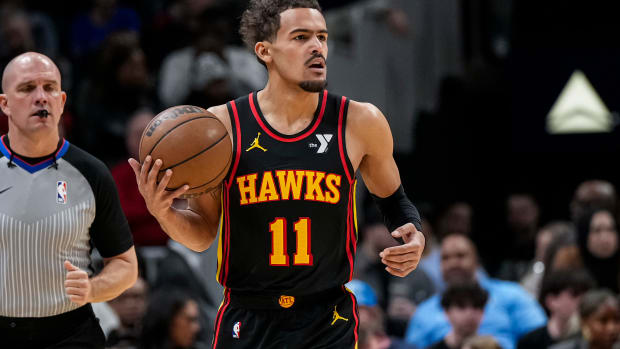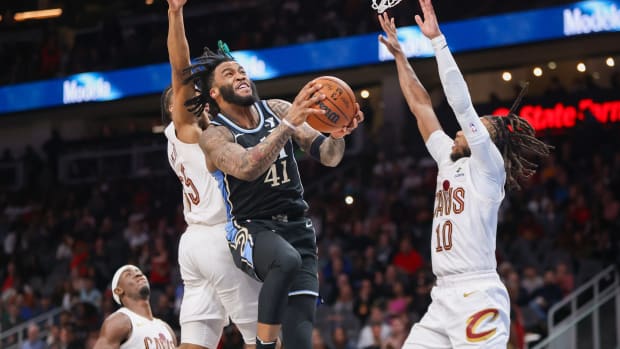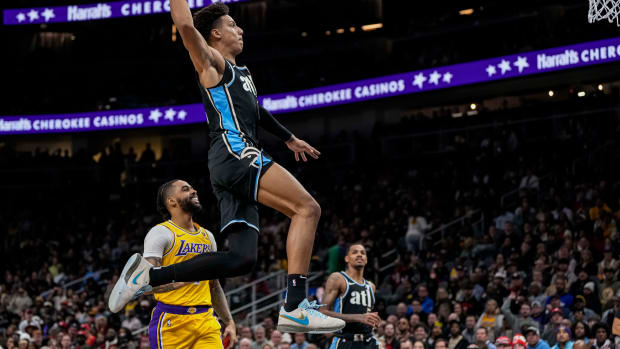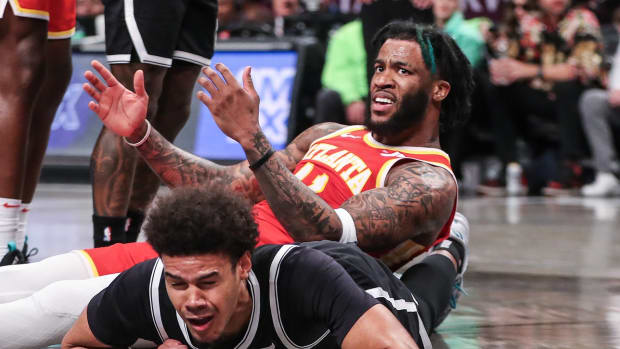Hawks Player Preview: De'Andre Hunter
When the Hawks selected De’Andre Hunter with the fourth pick in the 2019 NBA Draft, it was undoubtedly a reach. Atlanta gave significant draft capital and took on a hefty expiring contract for the right to select Hunter, who may have been selected outside the top five in other recent drafts. For most teams, fixating so heavily on one player as to virtually exclude alternatives would have been reckless, but having Hunter’s particular set of skills was more vital for Atlanta than nearly any other team picking in the lottery.
The Hawks are unambiguously building around Trae Young, an offensive dynamo capable of threading most any pass on the floor and stretching defenses with deep off-the-dribble range. That allows Travis Schlenk to craft the team’s roster in a specific way, with an eye for fit rather than talent alone. Atlanta didn’t need dynamic offensive force as much as a versatile, defensive-minded wing capable of shape-shifting to fit most any need in the modern NBA. It could hardly have found a player better suited to fill that role than Hunter, who, in theory is an ideal fit with Young.
Billed as one of the most NBA-ready players in his draft class, Hunter is a dependable spot-up shooter and versatile defender who should have an opportunity to contribute immediately. Atlanta has been intentional about involving him in the preseason, and he may already be the team’s best option defending elite wings and forwards. He’ll struggle at times – as most rookies to – as he learns the nuances of the NBA game on the fly, but will also receive the necessary reps and seasoning as he grows into the player Atlanta desperately needs him to become. There is a symbiosis to the partnership: the Hawks are counting on Hunter to blossom into a refined basketball Swiss army knife, but the rookie will only make that transformation under the right conditions. Hunter won’t be asked to carry the load most lottery picks are, but will still find the creative leeway to expand his game. Playing off of Young will create easy shots as Hunter finds his way and the Hawks are in position to tolerate growing pains under little short-term pressure.
While he was the oldest player selected in the top 10 this year and fits neatly within the classic 3-and-D parameters, the Hawks believe Hunter can become much more than that. Early in the preseason, he has operated more with the ball in his hands than his role at Virginia allowed – something Pierce plans on having him do regularly – and shown an ability to get downhill and finish through contact:
“Everybody says he’s a 3-and-D guy,” Pierce says. “I think he’s pretty good putting it on the floor and getting all the way to the rim… So we’re able to use him in some pick-and-rolls with his size, able to go at five-men at the rim pretty effectively.” The ability to simply put the ball on the floor and make sound decisions will be crucial for Hunter this season as teams run him off the three-point line and try to speed him up. He doesn’t possess elite vision or creativity as a passer, but can make basic reads out of the pick-and-roll and doesn’t appear hurried in the way many rookies do:
Those are relatively basic plays, but important ones for young players to hone. Windows in the NBA close in a matter of microseconds, and some players take years to consistently identify and manipulate them. Defensively, he also has room to stretch himself as a playmaker. Advanced though Hunter may be on that end, he doesn’t wreak havoc in quite the same way the NBA’s dominant perimeter defenders do; he’s disciplined, but not always disruptive. At 6-foot-8, 225 pounds, the 21-year-old is still nimble enough to switch across multiple positions, with the length to bother opponents of all sizes and skill sets. He’ll likely start on the wing, but gives Pierce the option of playing smaller lineups with Hunter at power forward. Hunter uses his chest exceptionally well when walling off drives or absorbing contact in the post and seldom gambles for steals or bites on pump fakes. He is nearly always well-positioned to stay in front of his man or provide help for a teammate.
But that discipline often comes at the expense of activity. His block and steal rates at Virginia were fairly pedestrian given his overall defensive impact, and Hunter often plays more reactively than proactively on that end. That sort of defender is extremely valuable, but the Hawks might need more from Hunter given their defensive weakness at other positions. Atlanta ranked near the bottom of the league last season in forcing turnovers, and any improvement will likely start with Hunter. “Defensively we’ve got to find a way to turn him up a little bit more,” Pierce said. “He’s a great cover defender, his length, he’s always in the right spot. I think he’s got more to bring and offer, and we’ll get him there.”
If his preseason is any indication – and it often isn’t – Hunter is well on his way. He has looked comfortable, assertive, and unwilling to let the game overwhelm him. “When you overthink it, that’s when you get nervous,” Hunter said. “You start trying to do too much. But I just try to do what I do every day, just go out there and do what I do in practice.” The rookie won’t morph into a lockdown defender or deadeye shooter overnight, but has already provided fleeting glimpses into a future in which he might. Players of his mold are immensely valuable in the modern NBA provided they have the right structure around them and the opportunity to thrive. Atlanta can offer him both; what remains to be seen is how much Hunter will give them in return.





